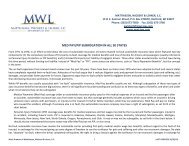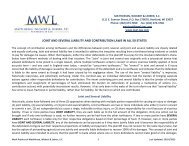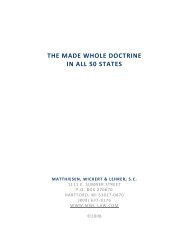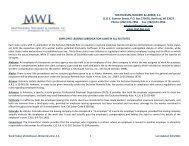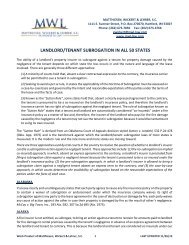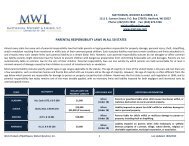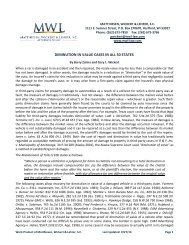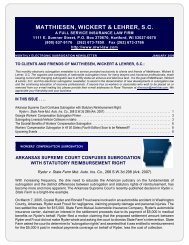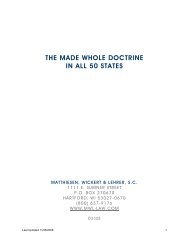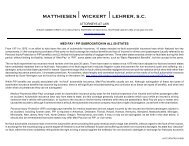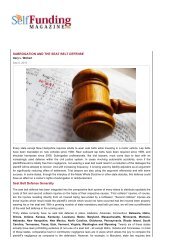SANCTIONS/ADVERSE INFERENCE: The court counteracts a party’s deliberate destruction <strong>of</strong> <strong>evidence</strong> throughevidentiary rules, civil sanction, and miss<strong>in</strong>g <strong>evidence</strong> <strong>in</strong>structions. Id.LOUISIANATORT OF SPOLIATION: Louisiana courts have recognized the right <strong>of</strong> an <strong>in</strong>dividual to <strong>in</strong>stitute a tort actionaga<strong>in</strong>st someone who has impaired the party’s ability to <strong>in</strong>stitute or prove a civil claim due to negligent or<strong>in</strong>tentional <strong>spoliation</strong> <strong>of</strong> <strong>evidence</strong>. Guillory v. Dillard’s Dept. Store, Inc., 777 So.2d 1, 3 (La. App. 3 rd Cir. 2000);McCool v. Beauregard Mem. Hosp., 814 So.2d 116, 118 (La. App. 3 rd Cir. 2002). A pla<strong>in</strong>tiff assert<strong>in</strong>g a state lawtort claim for <strong>spoliation</strong> <strong>of</strong> <strong>evidence</strong> must <strong>all</strong>ege that the defendant <strong>in</strong>tention<strong>all</strong>y destroyed <strong>evidence</strong>. Desselle v.Jefferson Hosp. Dist. No. 2, 887 So.2d 524, 534 (La. App. 2004). Allegations <strong>of</strong> negligent conduct are <strong>in</strong>sufficient.Qu<strong>in</strong>n v. RISO Investments, Inc., 869 So.2d 922 (La. App. 2004). Where suit has not been filed and there is no<strong>evidence</strong> that a party knew suit would be filed when the <strong>evidence</strong> was discarded, the theory <strong>of</strong> <strong>spoliation</strong> <strong>of</strong><strong>evidence</strong> does not apply. Desselle v. Jefferson Hosp. Dist. No. 2, 887 So.2d at 534.ADVERSE INFERENCE: The tort <strong>of</strong> <strong>spoliation</strong> <strong>of</strong> <strong>evidence</strong> has its roots <strong>in</strong> the evidentiary doctr<strong>in</strong>e <strong>of</strong> “adversepresumption,” which <strong>all</strong>ows a jury <strong>in</strong>struction for the presumption that the destroyed <strong>evidence</strong> conta<strong>in</strong>ed<strong>in</strong>formation detrimental to the party who destroyed the <strong>evidence</strong> unless such destruction is adequatelyexpla<strong>in</strong>ed. Guillory, supra.MAINETORT OF SPOLIATION: The Ma<strong>in</strong>e Law Court has apparently never recognized such a cause <strong>of</strong> action, for<strong>spoliation</strong> <strong>of</strong> <strong>evidence</strong>. Gagne v. D.E. Jonsen, Inc., 298 F.Supp.2d 145, 147 (D. Me. 2003); cit<strong>in</strong>g Butler v. Mooers,2001 WL 1708836 (Me. Super., June 13, 2001), at 1. In addition, federal courts sitt<strong>in</strong>g <strong>in</strong> Ma<strong>in</strong>e have identified<strong>spoliation</strong> as a doctr<strong>in</strong>e <strong>in</strong>tended “to rectify any prejudice the non-<strong>of</strong>fend<strong>in</strong>g party may have suffered as a result<strong>of</strong> the loss <strong>of</strong> <strong>evidence</strong> and to deter any future conduct, particularly deliberate conduct, lead<strong>in</strong>g to such loss <strong>of</strong><strong>evidence</strong>.” Drigg<strong>in</strong> v. American Sec. Alarm Co., 141 F.Supp.2d 113, 120 (D. Me. 2000).SANCTIONS: The remedy for <strong>spoliation</strong> <strong>of</strong> <strong>evidence</strong> is sanctions, <strong>in</strong>clud<strong>in</strong>g “dismissal <strong>of</strong> the case, the exclusion <strong>of</strong><strong>evidence</strong>, or a jury <strong>in</strong>struction on the <strong>spoliation</strong> <strong>in</strong>ference.” Id. This view <strong>of</strong> the doctr<strong>in</strong>e is not consistent withthe existence <strong>of</strong> an <strong>in</strong>dependent cause <strong>of</strong> action aris<strong>in</strong>g out <strong>of</strong> such deliberate conduct. Rather, the <strong>in</strong>jured partymay seek sanctions that will affect its claims or defenses. Pelletier v. Magnusson, 195 F.Supp.2d 214, 233-37 (D.Me. 2002); Elwell v. Conair, Inc., 145 F.Supp.2d 79, 87-88 (D. Me. 2001).MARYLANDADVERSE INFERENCE/PRESUMPTION: In Miller v. Montgomery County, 64 Md.App. 202, 214-15, 494 A.2d 761,cert. denied, 304 Md. 299, 498 A.2d 1185 (Md. 1985), Judge Bloom, writ<strong>in</strong>g for the Supreme Court <strong>of</strong> Maryland,expla<strong>in</strong>ed the effect <strong>spoliation</strong> <strong>of</strong> <strong>evidence</strong> might have on the spoliator’s case as follows: The destruction oralteration <strong>of</strong> <strong>evidence</strong> by a party gives rise to <strong>in</strong>ferences or presumptions unfavorable to the spoliator, the nature<strong>of</strong> the <strong>in</strong>ference be<strong>in</strong>g dependent upon the <strong>in</strong>tent or motivation <strong>of</strong> the party. Unexpla<strong>in</strong>ed and <strong>in</strong>tentionaldestruction <strong>of</strong> <strong>evidence</strong> by a litigant gives rise to an <strong>in</strong>ference that the <strong>evidence</strong> would have been unfavorable tohis cause, but would not <strong>in</strong> itself amount to substantive pro<strong>of</strong> <strong>of</strong> a fact essential to his opponent’s cause. UnderMiller, an adverse presumption may arise aga<strong>in</strong>st the spoliator even if there is no <strong>evidence</strong> <strong>of</strong> fraudulent <strong>in</strong>tent.Anderson v. Litzenberg, 115 Md.App. 549, 559, 694 A.2d 1<strong>50</strong>, 155 (Md. App. 1997). The presumption that arisesfrom a party’s <strong>spoliation</strong> <strong>of</strong> <strong>evidence</strong> cannot be used as a surrogate for present<strong>in</strong>g <strong>evidence</strong> <strong>of</strong> negligence <strong>in</strong> aprima facie case.SANCTIONS: Maryland courts have condoned discovery sanctions as remedies for <strong>spoliation</strong> <strong>of</strong> <strong>evidence</strong>. SeeKlupt v. Krongard, 728 A.2d 727, 738 (Md. Ct. Spec. App. 1999). The ultimate sanction <strong>of</strong> dismissal or defaultwhen <strong>spoliation</strong> may be imposed when the <strong>spoliation</strong> <strong>in</strong>volves: (1) a deliberate act <strong>of</strong> destruction; (2)8Work Product <strong>of</strong> <strong>Matthiesen</strong>, <strong>Wickert</strong> & <strong>Lehrer</strong>, S.C. LAST UPDATED 4/22/2013
discoverability <strong>of</strong> the <strong>evidence</strong>; (3) an <strong>in</strong>tent to destroy the <strong>evidence</strong>; (4) occurrence <strong>of</strong> the act at a time aftersuit has been filed, or, if before, at a time when fil<strong>in</strong>g is fairly perceived as imm<strong>in</strong>ent. White v. Office <strong>of</strong> the PublicDefender, 170 F.R.D. 138, 147 (D. Md. 1997). One court noted that the greatest <strong>of</strong> sanctions is appropriate whenthe conduct demonstrates willful or contemptuous behavior, or a deliberate attempt to h<strong>in</strong>der or preventeffective presentation <strong>of</strong> defenses or counterclaims. Manzano v. Southern Md. Hosp., Inc., 698 A.2d 531, 537(Md. 1997).MASSACHUSETTSTORT OF SPOLIATION: In Fletcher v. Dorchester Mut. Ins. Co., 437 Mass. 544, 773 N.E.2d 420 (2002), theMassachusetts Supreme Court decl<strong>in</strong>ed to recognize an action <strong>in</strong> tort for <strong>spoliation</strong> <strong>of</strong> <strong>evidence</strong>.SANCTIONS: The Massachusetts Supreme Court has recognized that Massachusetts courts have remedies for<strong>spoliation</strong> <strong>of</strong> <strong>evidence</strong>, i.e., exclusion <strong>of</strong> testimony <strong>in</strong> the underly<strong>in</strong>g action, dismissal, or judgment by default.Gath v. M/A-Com, Inc., 440 Mass. 482, 499, 802 N.E.2d 521, 535 (Mass. 2003). Sanctions should be carefullytailored to remedy the precise unfairness occasioned by the <strong>spoliation</strong>. Id. at 426; Keene v. Brigham & Women’sHosp., Inc., 786 N.E.2d 824, 833-34 (Mass. 2003). Sanctions may be imposed even if the <strong>spoliation</strong> <strong>of</strong> <strong>evidence</strong>occurred before the legal action was commenced, if a litigant knows or reasonably should know that the<strong>evidence</strong> might be relevant to a possible action. Stull v. Corrigan Racquetb<strong>all</strong> Club, Inc., 2004 WL <strong>50</strong>5141 (Mass.Super. 2004).MICHIGANTORT OF SPOLIATION: Michigan does not recognize <strong>spoliation</strong> <strong>of</strong> <strong>evidence</strong> as a separate tort. Panich v. IronWood Prods. Corp., 445 N.W.2d 795 (Mich. Ct. App. 1989). However, Michigan has never explicitly refused toconsider <strong>spoliation</strong> <strong>of</strong> <strong>evidence</strong> as an actionable tort claim if the right facts were present. Wilson v. S<strong>in</strong>ai GraceHosp., 2004 WL 91<strong>50</strong>44 (Mich. App. 2004).ADVERSE INFERENCE/PRESUMPTION: Spoliation <strong>of</strong> <strong>evidence</strong> is controlled by a jury <strong>in</strong>struction, M. Civ. J.I.2d6.01(d), which provides that a trier <strong>of</strong> fact may <strong>in</strong>fer the <strong>evidence</strong> not <strong>of</strong>fered <strong>in</strong> a case would be adverse to the<strong>of</strong>fend<strong>in</strong>g party if: (1) the <strong>evidence</strong> was under the <strong>of</strong>fend<strong>in</strong>g party’s control; (2) could have been produced bythe <strong>of</strong>fend<strong>in</strong>g party; (3) that no reasonable excuse is shown for the failure to produce the <strong>evidence</strong>. When thesethree elements are shown, a permissible <strong>in</strong>ference is <strong>all</strong>owed that the <strong>evidence</strong> would have been adverse to the<strong>of</strong>fend<strong>in</strong>g party. However, the trier <strong>of</strong> fact rema<strong>in</strong>s free to determ<strong>in</strong>e this issue for itself. Lagalo v. Allied Corp.,592 N.W.2d 786, 789 (Mich. Ct. App. 1999).When there is <strong>evidence</strong> <strong>of</strong> willful destruction, a presumption arises that the non-produced <strong>evidence</strong> would havebeen adverse to the <strong>of</strong>fend<strong>in</strong>g party, and when left unrebutted, this presumption requires a conclusion that theunproduced <strong>evidence</strong> would have been adverse to the <strong>of</strong>fend<strong>in</strong>g party. Trupiano v. Cully, 84 N.W.2d 747, 748(Mich. 1957). Gener<strong>all</strong>y, where a party deliberately destroys <strong>evidence</strong>, or fails to produce it, courts presume thatthe <strong>evidence</strong> would operate aga<strong>in</strong>st the party who destroyed it or failed to produce it. Johnson v. Secretary <strong>of</strong>State, 406 Mich. 420, 440, 280 N.W.2d 9 (Mich. 1979); Berryman v. K Mart Corp., 193 Mich.App. 88, 101, 483N.W.2d 642 (Mich. 1992); Ritter v. Meijer, Inc., 128 Mich.App. 783, 786, 341 N.W.2d 220 (Mich. 1983). It is wellsettledthat only when the compla<strong>in</strong><strong>in</strong>g party can establish “<strong>in</strong>tentional conduct <strong>in</strong>dicat<strong>in</strong>g fraud and a desire todestroy [<strong>evidence</strong>] and thereby suppress the truth” can such a presumption arise. Trupiano v. Cully, 349 Mich.568, 570, 84 N.W.2d 747 (Mich. 1957), quot<strong>in</strong>g 20 Am. Jur., Evidence, § 185, p. 191; Lagalo v. Allied Corp., 233Mich.App. 514, 520, 592 N.W.2d 786 (Mich. 1999).MINNESOTATORT OF SPOLIATION: M<strong>in</strong>nesota does not recognize an <strong>in</strong>dependent <strong>spoliation</strong> tort. Federated Mut. Ins. Co. v.Litchfield Precision Components, Inc., 456 N.W.2d 434, 437 (M<strong>in</strong>n.1990).9Work Product <strong>of</strong> <strong>Matthiesen</strong>, <strong>Wickert</strong> & <strong>Lehrer</strong>, S.C. LAST UPDATED 4/22/2013



